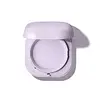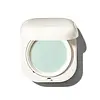What's inside
What's inside
 Key Ingredients
Key Ingredients

 Benefits
Benefits

 Concerns
Concerns

 Ingredients Side-by-side
Ingredients Side-by-side

Silica
AbrasiveDimethicone/Vinyl Dimethicone Crosspolymer
Skin ConditioningCaprylic/Capric Triglyceride
MaskingMica
Cosmetic ColorantMethicone
EmollientCI 77891
Cosmetic ColorantCI 77742
Cosmetic ColorantEthylhexylglycerin
Skin ConditioningNephrite Powder
AbrasiveDimethicone
EmollientGlyceryl Caprylate
EmollientButylene Glycol
HumectantWater
Skin ConditioningLactic Acid/Glycolic Acid Copolymer
Skin ConditioningKaolin
AbrasiveGlycerin
HumectantHydrolyzed Hyaluronic Acid
HumectantTin Oxide
AbrasiveMalpighia Glabra Fruit Extract
Skin ConditioningPropanediol
SolventHydrolyzed Corn Starch
HumectantPinus Densiflora Leaf Extract
AntimicrobialPolyquaternium-10
Saururus Chinensis Extract
Skin ConditioningEuterpe Oleracea Fruit Extract
1,2-Hexanediol
Skin ConditioningMother Of Pearl
AbrasiveHedychium Coronarium Root Extract
MaskingTocopherol
AntioxidantSodium Magnesium Silicate
Disodium EDTA
Sodium Benzoate
MaskingLactic Acid
BufferingPotassium Sorbate
PreservativeGlutathione
Diamond Powder
AbrasiveXanthan Gum
EmulsifyingSilica, Dimethicone/Vinyl Dimethicone Crosspolymer, Caprylic/Capric Triglyceride, Mica, Methicone, CI 77891, CI 77742, Ethylhexylglycerin, Nephrite Powder, Dimethicone, Glyceryl Caprylate, Butylene Glycol, Water, Lactic Acid/Glycolic Acid Copolymer, Kaolin, Glycerin, Hydrolyzed Hyaluronic Acid, Tin Oxide, Malpighia Glabra Fruit Extract, Propanediol, Hydrolyzed Corn Starch, Pinus Densiflora Leaf Extract, Polyquaternium-10, Saururus Chinensis Extract, Euterpe Oleracea Fruit Extract, 1,2-Hexanediol, Mother Of Pearl, Hedychium Coronarium Root Extract, Tocopherol, Sodium Magnesium Silicate, Disodium EDTA, Sodium Benzoate, Lactic Acid, Potassium Sorbate, Glutathione, Diamond Powder, Xanthan Gum
Silica
AbrasiveCaprylic/Capric Triglyceride
MaskingDimethicone/Vinyl Dimethicone Crosspolymer
Skin ConditioningMethicone
EmollientWater
Skin ConditioningChamomilla Recutita Flower Water
MaskingEthylhexylglycerin
Skin ConditioningGlyceryl Caprylate
EmollientButylene Glycol
HumectantMentha Arvensis Leaf Extract
MaskingDipotassium Glycyrrhizate
Humectant1,2-Hexanediol
Skin ConditioningHydrolyzed Hyaluronic Acid
HumectantHydrolyzed Corn Starch
HumectantPinus Densiflora Leaf Extract
AntimicrobialTocopherol
AntioxidantDisodium EDTA
Silica, Caprylic/Capric Triglyceride, Dimethicone/Vinyl Dimethicone Crosspolymer, Methicone, Water, Chamomilla Recutita Flower Water, Ethylhexylglycerin, Glyceryl Caprylate, Butylene Glycol, Mentha Arvensis Leaf Extract, Dipotassium Glycyrrhizate, 1,2-Hexanediol, Hydrolyzed Hyaluronic Acid, Hydrolyzed Corn Starch, Pinus Densiflora Leaf Extract, Tocopherol, Disodium EDTA
 Reviews
Reviews

Ingredients Explained
These ingredients are found in both products.
Ingredients higher up in an ingredient list are typically present in a larger amount.
1,2-Hexanediol is a synthetic liquid and another multi-functional powerhouse.
It is a:
- Humectant, drawing moisture into the skin
- Emollient, helping to soften skin
- Solvent, dispersing and stabilizing formulas
- Preservative booster, enhancing the antimicrobial activity of other preservatives
Butylene Glycol (or BG) is used within cosmetic products for a few different reasons:
Overall, Butylene Glycol is a safe and well-rounded ingredient that works well with other ingredients.
Though this ingredient works well with most skin types, some people with sensitive skin may experience a reaction such as allergic rashes, closed comedones, or itchiness.
Learn more about Butylene GlycolThis ingredient is an emollient, solvent, and texture enhancer. It is considered a skin-softener by helping the skin prevent moisture loss.
It helps thicken a product's formula and makes it easier to spread by dissolving clumping compounds.
Caprylic Triglyceride is made by combining glycerin with coconut oil, forming a clear liquid.
While there is an assumption Caprylic Triglyceride can clog pores due to it being derived from coconut oil, there is no research supporting this.
Learn more about Caprylic/Capric TriglycerideThis ingredient is a silicone used to improve the texture of products and absorb oil. It does not get absorbed into the skin.
Like other silicones, Dimethicone/Vinyl Dimethicone Crosspolymer helps condition the skin by creating a barrier. In this sense, it can act as an emollient and trap moisture in.
This ingredient is a type of elastomer.
Learn more about Dimethicone/Vinyl Dimethicone CrosspolymerDisodium EDTA plays a role in making products more stable by aiding other preservatives.
It is a chelating agent, meaning it neutralizes metal ions that may be found in a product.
Disodium EDTA is a salt of edetic acid and is found to be safe in cosmetic ingredients.
Learn more about Disodium EDTAEthylhexylglycerin (we can't pronounce this either) is commonly used as a preservative and skin softener. It is derived from glyceryl.
You might see Ethylhexylglycerin often paired with other preservatives such as phenoxyethanol. Ethylhexylglycerin has been found to increase the effectiveness of these other preservatives.
Glyceryl Caprylate comes from glycerin and caprylic acid, a fatty acid from coconut. It has emollient and emulsifier properties.
As an emollient, it helps hydrate your skin. Emollients work by creating a barrier on your skin to trap moisture in, helping to keep your skin soft and smooth.
On the other hand, emulsifiers prevent ingredients (such as oil and water) from separating.
Learn more about Glyceryl CaprylateHydrolyzed Corn Starch is made by breaking down corn starch into smaller sugar and carbohydrate units through acid or enzyme hydrolysis. The result is a blend of sugars (glucose, maltose, and maltodextrins).
It has skin conditioning and humectant properties and helps the skin stay hydrated. According to a manufacturer, this ingredient helps provide humidity resistance and frizz control in haircare.
Hydrolyzed Hyaluronic Acid is a form of hyaluronic acid. It is created by the hydrolysis of hyaluronic acid with a high molecular weight. Once created, Hydrolyzed Hyaluronic Acid has a low molecular weight.
Low molecular weight HA has been shown to hydrate and increase elasticity of the skin. Increasing elasticity is also associated with reduction of wrinkle depth.
One study found topical low molecular weight hyaluronic acid may be considered for the treatment of rosacea in the adult population. However, we always recommend speaking with a professional about your skin concerns.
Hyaluronic acids are a humectant. This means they draw moisture from the air. Hyaluronic acids help moisturize, soothe, and protect the skin.
Read more about other common forms of hyaluronic acid:
Learn more about Hydrolyzed Hyaluronic AcidMethicone is a type of silicone and is a simpler form of dimethicone.
Silicones are used to enhance the texture of products and have emollient properties. Methicone is used to give products a silky texture and improves spreadability.
Pinus Densiflora Leaf Extract is an antioxidant.
Silica, also known as silicon dioxide, is a naturally occurring mineral. It is used as a fine, spherical, and porous powder in cosmetics.
Though it has exfoliant properties, the function of silica varies depending on the product.
The unique structure of silica enhances the spreadability and adds smoothness, making it a great texture enhancer.
It is also used as an active carrier, emulsifier, and mattifier due to its ability to absorb excess oil.
In some products, tiny microneedles called spicules are made from silica or hydrolyzed sponge. When you rub them in, they lightly polish away dead skin layers and enhance the penetration of active ingredients.
Learn more about SilicaTocopherol (also known as Vitamin E) is a common antioxidant used to help protect the skin from free-radicals and strengthen the skin barrier. It's also fat soluble - this means our skin is great at absorbing it.
Vitamin E also helps keep your natural skin lipids healthy. Your lipid skin barrier naturally consists of lipids, ceramides, and fatty acids. Vitamin E offers extra protection for your skin’s lipid barrier, keeping your skin healthy and nourished.
Another benefit is a bit of UV protection. Vitamin E helps reduce the damage caused by UVB rays. (It should not replace your sunscreen). Combining it with Vitamin C can decrease sunburned cells and hyperpigmentation after UV exposure.
You might have noticed Vitamin E + C often paired together. This is because it is great at stabilizing Vitamin C. Using the two together helps increase the effectiveness of both ingredients.
There are often claims that Vitamin E can reduce/prevent scarring, but these claims haven't been confirmed by scientific research.
Learn more about TocopherolWater. It's the most common cosmetic ingredient of all. You'll usually see it at the top of ingredient lists, meaning that it makes up the largest part of the product.
So why is it so popular? Water most often acts as a solvent - this means that it helps dissolve other ingredients into the formulation.
You'll also recognize water as that liquid we all need to stay alive. If you see this, drink a glass of water. Stay hydrated!
Learn more about Water